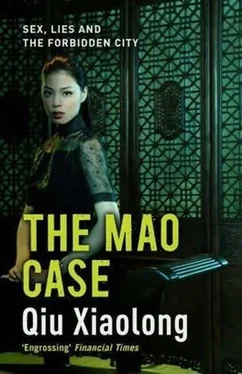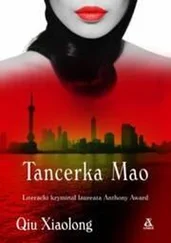The bulging shape of the envelope suggested something like a book inside. He thought he could guess what it was. Once again, Ling had helped him, not only with access to the Central South Sea. He didn’t tear open the envelope in the presence of Fang.
So he checked the map and headed for the Harvest Garden, the original name for Mao’s residence. In the Qing dynasty, the Harvest Garden had been used as a scenic imperial study. It was in the shape of a large quadrangle house, with five rooms in a row along each side and a courtyard in the middle.
The Harvest Garden looked deserted that morning. Chen walked in, started looking around here and there. Some of the rooms were locked. He pushed open the door of the bedroom.
What first struck him as unusual in the room was the extraordinarily big bed. Larger than a king-size one, apparently custom-made, but apart from its size, it was simple and plain. About a quarter of the bed was practically covered with books. It appeared as if Mao had slept with books.
Chen reached out and picked one up. Zizhi Tongjian, sometimes called the “Mirror of the History.” It was a history book written by Sima Guang, a renowned Confucian scholar in the Song dynasty, intended to mirror history in such a way that emperors could learn lessons by examining it. Mao was said to have read it seven or eight times. Most of the books on the bed turned out to be similar classics and histories.
According to Mao, history is an ever-continuous process of one dynasty succeeding another. Those at the bottom rise in rebellion to overthrow the one at the top, though the successful rebel inevitably turns into the emperor, as corrupt and oppressive as was the predecessor. Being part of modern Chinese history, having actually shaped that part of history which shaped him as well, Mao declared, “All the theories of Marxism can be summed up in one sentence: it is justified to rebel.” As an ambitious and accomplished rebel, marching under the banners of Marxism and communism, Mao put to good use the knowledge he had learned from those history books, some of which Chen was holding in his hands.
And Chen couldn’t help imagining Mao alone in the room, reading late into the night. According to the official publications, Madam Mao didn’t live with Mao. In his last ten years, Mao lived by himself – except for his personal secretaries, nurses, and orderly. Behind the communist-god mask, Mao must have been a solitary man seeing his dream of the grandest empire slipping away, not prepared to lead the country into the twentieth century, yet anxious to prove himself an emperor greater than all those before. So he wielded such terms as “class struggle” and “proletarian dictatorship,” launching one political movement after another, stifling all the opposition voices, until things came to a head during the Cultural Revolution. At night, however, surrounded by the ancient books, paranoid of “capitalist roaders” who would try to usurp his power and “restore capitalism,” Mao suffered from insomnia, hardly able to move because of his failing health…
Chen leaned down, touching the bed. A wooden-board mattress, as he had read in those memoirs, which claimed that Mao, working for the welfare of the Chinese people, cared little about his personal comfort. Chen wondered whether Mao had ever thought of Shang while on this bed.
Chen turned to look at the bathroom. In addition to the standard toilet, there was another one on the floor, shaped like a porcelain basin, over which one had to squat – specially designed for Mao, who must have carried with him to the Forbidden City his habit acquired as a farmer from a Hunan village.
It was another puzzling detail, but not all details would be relevant to his investigation. He hadn’t been able to establish a connection, he thought, between himself as investigator and Mao as a suspect. Instead, he came to find himself in the presence of another man, long dead and mysterious, but not the god Chen remembered from his school years.
Carrying the large envelope in his hand, Chen moved out into the garden. There seemed to be something sacrilegious about reading the book Ling sent him while in Mao’s room. But he wanted to read it here instead of back at the hotel, while looking up at the tilted eaves of the palace shimmering in the summer foliage, as if the location made a difference.
He perched himself on a slab of rock, on which Mao might have sat many a time. A stone kylin that had once escorted the emperors here stared at him. Lighting a cigarette, he remembered Mao was a smoker too – a heavier one. Chen hadn’t the slightest desire to imitate Mao.
Sure enough, as he had guessed, the large envelope contained the book written by Mao’s personal doctor. There was another envelope inside, smaller and sealed – probably the love poems written for Ling, long ago. He wasn’t going to read them at the moment. So he opened the book, turning to the introduction. The author claimed to have served as Mao’s personal physician for over twenty years, to know the intimate details of Mao’s life.
Instead of reading from the beginning, Chen moved to the index at the end. To his disappointment, there was no listing for Shang. Leafing through the book, he tried to find anything relevant.
The book didn’t focus exclusively on the personal life of Mao. The doctor also wrote about his own life, from an idealistic college student to a sophisticated survivor in those years of power struggle. For common readers, however, the appeal of the book lay in the description of Mao’s life – of an emperor both in and out of the Forbidden City. The chapter Chen was reading happened to be about Mao traveling around luxuriously in a special train. In the train, he actually took a young attendant named Jade Phoenix to bed. She was only sixteen or seventeen at the time. Afterward, he brought her back to the Central South Sea as his personal secretary. She eventually became more powerful than the politburo members, for she alone understood what he mumbled after his stroke, being one of few he could really trust. But she was only one of the many “favored” by Mao, who actually picked up women all over the country, in a variety of circumstances, including at those balls arranged for him in Shanghai and in other cities.
Mao seemed to have a preference for young girls with little education, not intelligent or sophisticated – simply young, warm bodies in a cold night. Shang was different from Mao’s usual type. But then a celebrated actress would have her attractions. It was nothing for an emperor to have dozens of imperial concubines.
The book confirmed what Chen had learned from other sources. Like an emperor, Mao set no store by his women, taking them as nothing but the means to satisfy his “divine” sexual needs.
A blue jay flew by. Chen thought he caught a flash of the afternoon sunlight on its wings.
whatever Mao might have done as the supreme Party leader, what he did to Shang was inexcusable, not to be easily written off, not even from a policeman’s perspective. Chief Inspector Chen was too depressed to think long along these lines.
He took out the smaller envelope, in which Ling might have left a note for him.
To his surprise, he found, instead of his poems, a manila folder marked, “Records of the Special Team from CCPC Cultural Revolution Group: Shang.”
How could Ling have got hold of this crucial information? It must have been at great risk to herself, as in another case years ago.
Only there was no stepping twice into the same river.
He started reading what was in the folder. It consisted of reports submitted by the special group. Most of them were written in the “revolutionary language” of the time, so he had to guess at the meaning couched in the political slogans and jargon.
Читать дальше












